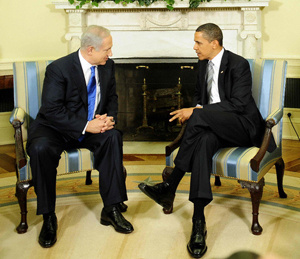Fuzzy Talks, Unfriendly Vibes
Netanyahu meets Obama to prepare further pressure. By Ebrahim Mottaqi.

Netanyahu’s visit to United States will be a definitive point in Israel-U.S. relations since during the recent months Israelis have been quite concerned over United States’ Middle East policies. Tel Aviv believes that United States’ flexibility towards resistance groups has reached a level that compels Israel should give a second thought to trust in American leaders. Netanyahu’s six-day visit to United States shows that Israelis are seeking support for their policies not only inside their own country but also in the United States. The Israeli prime minister’s initial goal is to convince United States to follow its line on Hamas, Hezbollah, Iran, Syria and other regional actors.
In the new international atmosphere (developed with Obama’s presidency), Americans are tentative in supporting Israel’s radical policies. United States has admonished Tel Aviv about any aggressive policies, insisting that Israel’s unilateral measures will face U.S. response. It seems that Israel is facing an uncertain situation and Simon Peres’ visit to United States before Netanyahu was probably aimed to create a positive atmosphere in which Netanyahu could negotiate with Obama.
The current circumstances show that the two sides do not fully trust each other and this makes the direction of negotiations unclear. Lack of a positive attitude between Obama and Netanyahu adds to the problem. In such a situation, Israeli PM’s six-day visit to United States is probably to pave the way for exerting further pressure on Obama’s administration. In fact, the visit has greater impacts for the United States since it can bring hard days for it in the future. Pressure by pro-Israel lobbies, initiated after Israeli foreign minister and PM initiatives, will naturally have reverse effects for United States’ Middle East policies.
In the new international atmosphere (developed with Obama’s presidency), Americans are tentative in supporting Israel’s radical policies. United States has admonished Tel Aviv about any aggressive policies, insisting that Israel’s unilateral measures will face U.S. response. It seems that Israel is facing an uncertain situation and Simon Peres’ visit to United States before Netanyahu was probably aimed to create a positive atmosphere in which Netanyahu could negotiate with Obama.
The current circumstances show that the two sides do not fully trust each other and this makes the direction of negotiations unclear. Lack of a positive attitude between Obama and Netanyahu adds to the problem. In such a situation, Israeli PM’s six-day visit to United States is probably to pave the way for exerting further pressure on Obama’s administration. In fact, the visit has greater impacts for the United States since it can bring hard days for it in the future. Pressure by pro-Israel lobbies, initiated after Israeli foreign minister and PM initiatives, will naturally have reverse effects for United States’ Middle East policies.

